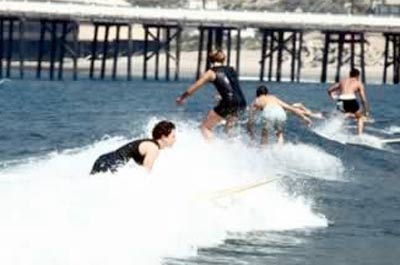(单词翻译:单击)
情景对话
Joel: So, Mitchell, I only surfed for about a year and I never got very good at it. I wonder if you could explain how a beginner goes about learning how to surf.
乔尔:米切尔,我刚接触冲浪一年的时间,我一直玩不好。我在想你是否能解释一下初学者要如何学习冲浪。
Mitchell: Well, that's a tough question because I was surfing ever since I was small so it came natural to me, surfing, but since I know I surf. The beginning is put your board in the sand, lay on your board on the sand, pretend that you are paddling and then push yourself up like a push-up and then stand. You repeat that over-and-over again and eventually you enter the water and you get a friend to hold the board for you and then you stand up in the water while your friend pushed the board to gain balance.
米切尔:这是一个很难回答的问题,因为我很小就开始冲浪了,所以对我来说这是很自然的事情,我有记忆以来就已经开始冲浪了。开始时你要把冲浪板放在沙子上,把你的冲浪板放在沙子上,像划桨一样,把自己推出去,接着站起来。要不停地重复这个动作,直到你进入水中,之后要有一个朋友帮你扶着冲浪板,朋友帮你保持冲浪板的平衡时,你就可以站在海上的冲浪板上了。
Joel: The part I had the hardest time with was when there were big waves, it was so hard to get out far enough so that you could actually catch a wave. What do you call it, "duck diving"?
乔尔:我觉得最难的是有大浪过来的时候,很难保持足够赶上好浪的距离。你们称之为什么,潜越吗?
Mitchell: Duck diving, yeah, it's key to surfing. If you see a wave, the thing is that you have to see the wave before it comes. That's the secret, like where's it crashing and when it's crashing. We call it "crashing" when it's coming down. Duck diving, you put your knees on the board if it's a big wave...
米切尔:对,潜越,这对冲浪来说很关键。假设你看到了一个浪,关键是你必须要在海浪过来前看到它。这是秘诀,要清楚浪会在何时何地打到你。海浪袭来时我们称之为“撞”。如果是一个大浪的话,那潜越时你要跪在冲浪板上……
Joel: Oh, you get on your knees.
乔尔:哦,要跪在冲浪板上。
Mitchell: You get on your hands and knees and you push the nose of the board down.
米切尔:用双手和膝盖撑住冲浪板,然后将冲浪板前端放低。
Joel: OK, push the front part down.
乔尔:好,把冲浪板前端放低。
Mitchell: Yeah, and at the same time, after you push it down, you also kick your hips, and push with your hips, like how you dive in water, like a dolphin.
米切尔:对,冲浪板放低的同时会碰到你的臀部,你要用臀部推进,就像潜水一样,像海豚一样。
Joel: OK, and then when the wave crashes over you, do you lay down on the board.
乔尔:好,那当浪要盖过你的时候,你是躺在冲浪板上吗?
Mitchell: You get back up. You pull your nose back up.
米切尔:要再起来。要把冲浪板前端再抬起来。
Joel: OK, you pull the front and back, back up, and that helps you to back under the wave. And what about when you're...
乔尔:好,把冲浪板前端抬起来,这有助于冲浪。那……
Mitchell: But the key is, you don't want to duck dive when the wave is crashing on you because you are already screwed.
米切尔:关键是,你在浪打到你的时候是不会想潜越的,因为你已经错过了。
Joel: OK, you have to duck before the wave.
乔尔:好,要在浪来之前潜越。
Mitchell: Before the wave or when it's crashing on you, like we call it white water. A lot of times you duck dive in white water. White water is when the wave crashes. The water looks like it's all white like white cotton candy, so you duck dive underneath that.
米切尔:在浪来之前或者说在浪快打到你的时候,也就是我们所说的碎浪水花。有很多时候你是在浪花中潜越。浪花是海浪撞击后产生的。那时的水看上去是纯白色,就像棉花糖一样,所以你要在浪花下面潜越。
Joel: And when you're catching a wave, how do you know when to stand up?
乔尔:在赶上好浪时,你怎么知道什么时候站起来合适?
Mitchell: Like when the wave, when you see the wave coming you start paddling to get with the wave and before the wave even starts curling, you're already getting ready to stand up. It the wave is already curling, and your standing up, it's too late.
米切尔:在你看到海浪过来时,你就要开始向海浪划过去,在海浪翻卷以前你就要准备站立。海浪翻卷以后你再站起来就太晚了。
Joel: It's too late. OK. So you have to stand up...
乔尔:太晚了。所以站立的时机是……
Mitchell: Before it starts curling.
米切尔:在海浪开始翻卷以前。
Joel: I see. I see.
乔尔:我明白了。我知道了。
Mitchell: And going the direction where it's crashing.
米切尔:要随着海浪冲浪。
Joel: Well, I'm going to have to go surfing with you sometime so I can have a private lesson.
乔尔:好,找个时间我要和你一起去冲浪,这样我就能单独上课了。

译文属可可原创,仅供学习交流使用,未经许可请勿转载
重点讲解
重点讲解:
1. ever since 自从;打…以后一直;
例句:He's been under a cloud ever since he failed to finish his project on time.
他自从没能按时完成计划以来,就一直受到冷遇。
2. over and over again 一再;再三;反复;
例句:TV ads are usually repeated over and over again.
电视广告通常一遍又一遍地重复播放。
3. at the same time 同时;
例句:At the same time, we have export licence.
同时,我们有出口许可。
4. get ready to do sth. 准备好的;胜任的;
例句:We always get ready to live, but never living.
我们是始终在为生活作准备,却始终不真正地生活。


